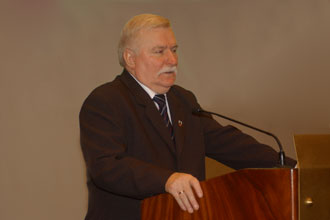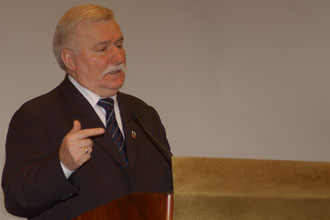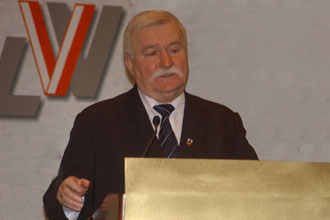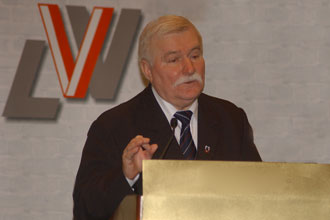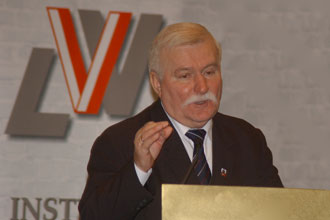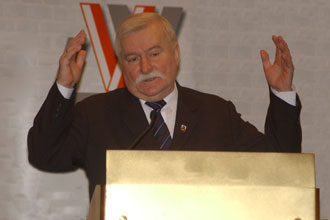A Biographical Note
Lech Walesa was born on September 29, 1943 at Popowo, near Lipno, in the Dobrzyń Region. His father Boleslaw, a carpenter by trade, was respected and esteemed by the local community. Sent to a labour camp for refusing to work for the Nazis during World War II, he returned from there totally devastated healthwise, to shortly fall ill and pass away. Lech's mother, Feliksa Kamieńska, born to an old Polish family with strong traditions, brought up her children as patriotic and pious people. After Boleslaw had passed away, his brother took care of Lech's family.
Young Lech Walesa attended school in nearby Chalin and Lipno. Later, he started working as an electrician at a Machine Construction Centre. Soon he was conscripted into the army and did his obligatory military service in Koszalin. Already there he would display his leadership qualities. As the head of his squad, he was demanding, but displayed a great aptness in problem solving and motivating people to work. He finished his military service in the rank of corporal. Years later, he would refer, often jokingly, to that period of his life, claiming that his army experience proved useful in negotiating with generals.
Having completed his military service, just like many other young people at the time, he decided to move to Gdansk in search of better work and opportunities. As a highly skilled worker, he was given a job at the Lenin Shipyard as a ship electrician. Since that moment, his life has been tied to Gdansk. It was here that he met Danuta Gołoś, whom he married on 8th December 1969.
The first mention of Walesa's dissident activity goes back to 1968, when he is said to have encouraged his fellow workers in the Shipyard to boycott official rallies condemning students' strikes. From that time he started to be increasingly active in social matters. He actively participated in the Strike Committee in December 1970, and even was offered the post of the president of the Committee.
After the tragic developments of the 1970 strike, which ended in the death of 39 workers, he swore that he would never allow for such situation to happen again. Soon afterwards Walesa became strongly committed to dissident Free Trade Unions. He would organize Shipyard workers' actions, distribute underground leaflets, hold meetings to teach workers about their rights and educate them. His main goal at the time was to commemorate the victims of the December 1970 events. Elected as the delegate to the Shipyard Council, he soon became a Volunteer Labour Inspector. A year later, however, he resigned, signaling that this function was only illusory and that actual introduction of any change was not possible. In subsequent months a wave of repressions touched people who had participated in the 1970 strike, and Lech Walesa was among them. However, at that point the workers' self-government managed to defend his job. Further efforts of Lech Walesa to commemorate the victims of the December 1970 events - such as organizing annual manifestations and laying wreaths in front of the Shipyard gate, activities in Free Trade Unions, as well as unruly attitude towards the authorities led to expulsion from the Shipyard in 1976. From there, he moved to ZREMB Company, where he worked as an electrician. Continuing his mission of teaching the workers about their rights, he was further involved with the Free Trade Unions. He was soon laid off from ZREMB for political reasons. In May 1979, he was employed by Elektromontaż Company, but he worked for them only until December of that year. This time he was dismissed for having participated in the celebration of the 1970 strike anniversary.
The 1970s were extremely challenging and painful for Lech Walesa and his family. He lived under constant surveillance of the State Security Service. His home and his workplace were tapped, and Lech Walesa was incessantly spied upon and repressed.
Until the beginning of the August 1980 strike he had been jobless. He was one of the main instigators of the August protest, and when the Shipyard workers began to flock in front of the Management building on the Shipyard premises, Walesa made his famous "jump over the fence" and found himself in the heart of the events. Everything that happened in August 1980 affected the course of Polish history, but also the history of Europe and the world. The personal stand of Lech Walesa, his tenacious negotiations, and struggling for the strikers' demands, support and trust that he enjoyed on the part of the strike participators throughout Poland, contributed to creating the sense of solidarity and community among Poles, which was institutionally expressed with the establishment of the Free Independent Trade Union Solidarity, and the first bloodless victory in Polish history. That was the time when all the world followed the events in Poland, Gdansk and the moves of Lech Walesa, who would represent the interests of his countrymen with dignity, winning admiration and respect of the free world.
The totalitarian regime reacted to all those developments by introducing martial law on December 13, 1981. Lech Walesa was among the first individuals to be interned. He was at first kept in Chylice, later in Otwock, to finally end up in Arłamów, where he was interned until November 1982. A year later, he resumed work at the Gdansk Shipyard as an electrician, where he was officially employed until 1990.
All the way through the dark time of martial law and difficult period after the ban of Solidarity, when the Union was routed and few people retained any hope for victory, Lech Walesa was the one who would not surrender. He remained the living symbol, spokesman, and propagator of the idea of solidarity. Despite fabricated rumours slandering his person, despite continuous harassment by the repression services of Communist Poland, he did not give in. His struggle was appreciated both within Poland and outside the country, with Nobel Peace Prize being awarded to him in 1983. Fearing that he might not be allowed to freely return to Poland, Lech Walesa decided against personally receiving the honour. His wife Danuta and son Bogdan acted on his behalf receiving the Prize in Oslo.
By the end of the 1980s, Lech Walesa sat down to negotiate with the Communist authorities at the Round Table. The peaceful transformation, called a bloodless revolution, was an exceptional phenomenon in the world and an example for others how to reach an agreement and carry out political change. Determination and courage of Lech Walesa, who headed the delegation of the democratic opposition at the Round Table, led to a compromise with the already weak, but still dangerous Communist regime, and this culminated in the election of 4th June 1989 and the establishment of the first non-Communist government on the Eastern side of the Iron Curtain.
On 15th November 1989 Lech Walesa became the third foreigner in history to address the joint sessions of the US Congress, starting his speech with the famous words: "We, the People!".
The subsequent years of Lech Walesa's activity were committed to the struggle towards further democratization of Poland and transformation towards market economy .
On 22nd December 1990, Lech Walesa became the first democratically elected president of Poland. His years in office witnessed hard economic transformation and struggle for political change. Lech Walesa's major achievements include the withdrawal of the Soviet troops from the Polish territory, a substantial reduction of Polish foreign debt, recovering documents of the Katyń massacre, as well as holding a big celebration to commemorate the 50th anniversary of the Warsaw Uprising. During his years in office he never forgot where he had come from: he was trying to support workers in the tough times of the economic transformation. He put forward his own proposals, and was always ready to talk, debate, mediate. Moreover, he never avoided responsibility for his decisions and for adopting a challenging, often painful way leading to personal and economic liberty, for which he paid the price of defeat in the re-election bid in 1995.
While in office, and after completing it, Lech Walesa remained the spokesman for the Polish cause on the international arena. He strived towards Poland's accession into NATO and the EU. In 1995, he founded The Lech Walesa Institute, whose mission is to support democracy and local governments in Poland and throughout the world. Today, Lech Walesa continues his mission of the propagator of solidarity. While traveling the globe, he reminds the whole world of the Polish example and the non-violent struggle for peace and democracy.




